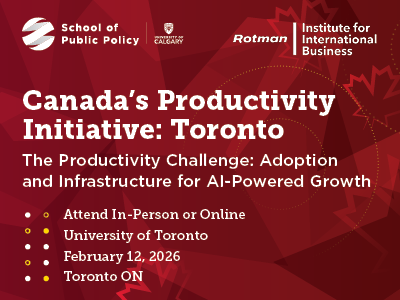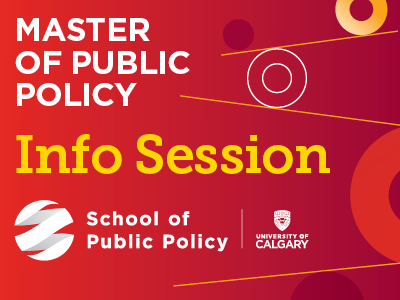NEWS: Trade-enabling transportation infrastructure key to boosting Canadian productivity

Canada’s Productivity Initiative: Vancouver
VANCOUVER — With Canada’s trade infrastructure stretched to its limits and development of economic corridors emerging as a national priority, economist Trevor Tombe called on governments to enhance our transportation assets during the Vancouver session for Canada’s Productivity Initiative.
The issue of developing new markets for our goods has become a priority with the United States imposing tariffs on imports from Canada and Tombe urged governments to work with the private sector to facilitate access to new markets.
“If we want to have trade diversification with other countries, we need the capacity in our ports and rails to do that,” said Tombe, Director of Fiscal and Economic Policy at the School of Public Policy.
The one-day session titled Infrastructure and Productivity: Getting Canada’s Economic House in Order was held at the Deloitte Summit in Vancouver in June and brought together leaders from industry, government, and academia. The session was presented by the School of Public Policy working with the Business Council of British Columbia (BCBC) and Trans Mountain Corp.
The critical role modern infrastructure and the need for economic corridors in Canada to enhance productivity was the theme in the keynote addresses, panel discussions and experts’ workshops.
Lifting productivity at B.C. ports, airports, and rail infrastructure is critical to improving Canadian living standards, said Laura Jones, President and CEO of BCBC. She emphasized Vancouver’s critical role as Canada’s gateway to Asia-Pacific markets and as a key element in improving productivity across the country.
“If we can make improvements here, we can make improvements in our standards of living across Canada,” Jones said.
Ian Anderson, the former CEO of Trans Mountain, relayed his experiences in the decade-plus timeline it took for the expansion of only oil pipeline from Alberta to the B.C. coast and came into service last year.
“The more we as a country can rely upon collaboration between federal, provincial and municipal authorities to keep work efforts efficient,” Anderson said, “the more productive Canada is.”
Other key speakers at the event included Kevin Volk, Assistant Deputy Minister, Ministry of Transportation and Transit, Peter Xotta, President and CEO, Vancouver Fraser Port Authority, and Tamara Vrooman, President and CEO, Vancouver International Airport.
The Vancouver session marks the halfway point of the six sessions the School is hosting this year to address the long-standing declines in Canada’s economic productivity. After sessions in Ottawa, Halifax and Calgary in the first half of the year, forums will resume in September in Saskatoon, Montreal and Toronto.


